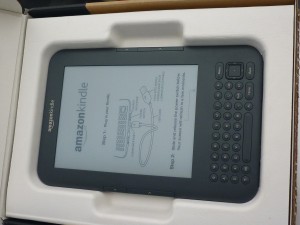What’s Real Reading? The E-books or Print Books Debate

iTDi Community Director
If you want to start an argument among a room full of reading specialists, ask them what reading is and how best to teach it. The reading wars have been raging for decades, and no one has ever really had a correct answer to these questions even in the pre-digital age when books were books and the printed word was all there was. Now in the digital age, the questions have become enormously complicated. What is reading? What actually happens when we read? Does the brain respond differently to flat words on a printed page than it does to hyperlinked words on a digital platform that lead us to interactive graphs, reader reviews, YouTube Videos, and more? Is reading online really reading? Is Google making us stupid?
Although I have spent the greater part of my professional life trying to figure all this out, what really interests me now is why some people become readers while others will openly tell you that they don’t like reading, or even that they don’t read. As a person who can’t leave the house without a bag full of books and a fully loaded Kindle, I find this hard to understand. What do they mean they don’t read, I wonder, and so I ask them. They usually mean books, particularly the kind of books people read in school or for pleasure. Then I wonder how might it be possible to turn non-readers into readers and since this is such an important thing to do, does it really matter whether new reader read printed books or e-books or band fan sites or hotel reviews on the Internet? It’s all reading, right?

My own position is that somehow it’s all reading and that it doesn’t matter what people read as long as they read, and I’ll tell you why later, but right now I’d like you to read what Christina Markoulaki and Barbara Hoskins Sakamoto have to say about e-books and printed books, and how they approach reading in their classrooms. Then I’d like you to go to http://itdi.pro/ and tell us what you think by posting a comment in the E-Books or Print Books Debate. You’ll find my answer there. You’ll need to log-in to the http://itdi.pro/ site and thenclick on Forums to get there, but that’s pretty easy to do.
From time to time we’ll feature a debate like this one on the iTDi Blog with the hope that you will join in the discussion. Feel free to respond to any of the points Christina and Barbara make in their thoughtful posts or to any of the questions I’ve raised here. Also, we’d love to know more about what you read and how you read it, but more importantly, what and how do your students read?
If you’d like to do a little more, you might like to conduct a reading survey like the one proposed by Katherine Schulten and Shannon Doyne in their New York Times article on the future of reading.
They suggest “keeping a 24-hour reading journal in which you note everything you read, as well as in what setting and on what device you read it … At the end of the day, tally how much of what you read was on a device or in a format that didn’t exist 10 years ago. Then ask yourself, which of these reading experiences would you say counts as real reading, and which doesn’t? Why? Do you think your answer would be different than the answer of someone in a different generation?” I’ve been doing this myself throughout the day, starting with the Facebook posts I read soon after getting up this morning, continuing on through the articles I read while writing this, a bit of news here and there in-between, Christina and Barb’s blog posts which of course led me to other blog posts, translating the directions I needed to read on a medicine bottle, scanning the lyrics to a song, sorting through a whole bunch of email, and reading the novel I’ve been enjoying for weeks, a little at time. What I’ve found out is that I read even more than I thought I do.
How about you?

Photo by @aClilToClimb on http://www.flickr.com/photos/eltpics/


Dear Chuck,
Thanks for making me think and reflect on these issues. If I were to carry out a reading journal, I’ll be surprised to find out that I read much more than I think I do. In my case, I should separate the reading I do as part of my job, as a teacher and as a translator and the reading I do for pleasure. I don’t read e-books but I love reading posts many educators write for professional development.
Thanks to your recommendation, I’ve taken up reading for pleasure. As I was at my Dad’s I restarted with one my teenage books, ‘Jonathan Livingston Seagull,’ by Richard Bach, with whom I’ve always felt identified for his love of freedom and his need to break rules.
Hugs,
Marisa
I love that you look at the broader picture of reading, Chuck! If we notice how important reading is in our daily life (rather than simply how many novels we read) it’s much easier to see the value of developing literacy, and to learn how to adjust our approach to reading depending on what it is we’re trying to do.
It doesn’t matter so much whether the reading is electronic or ink on paper–it’s all important 🙂
Hello Chuck, I am Hesty, the person who won the door prize in your Jakarta’s workshop on February 4th, 2013. Did you still remember me? I have answered the question about you, at that, the question was “who write the song that you used for your presentation?” I answered, it was written by your son, Ray Sandy.
Reading Chuck’s writing on reading makes me realize that I am lack of reading recently, this is a kind of contemplation for me that “Am I a good teacher for my students?” Anyway, thank you for reminding me to read.
Regards,
Hesty